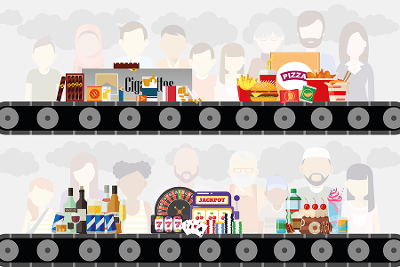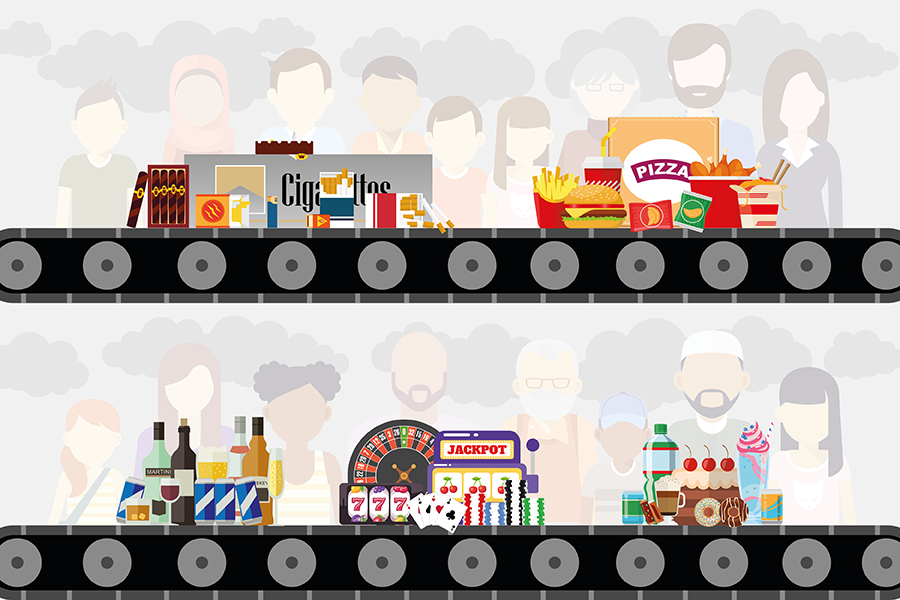Industry tactics cutting lives short for profit

The same tactics used by the tobacco industry to normalise smoking are being used to promote other products that put public health at risk.
That's the warning from Gateshead's Director of Public Health, whose latest report highlights how lives are being cut short by commercial organisations in pursuit of profit.
"Profit Before People" is Alice Wiseman's 7th annual report as Director of Public Health. Its purpose is to set out a professional perspective of a specific issue that affects the health and wellbeing of Gateshead's communities, with previous reports focusing on obesity, COVID-19 and women's health.
The new report looks at private sector activities that affect people's health, either directly or indirectly - known as the commercial determinants of health. It examines the tactics used by the tobacco industry over centuries to create an epidemic, including aggressive marketing, lobbying and casting doubt on scientific evidence of smoking-related harm. Worryingly, these methods are now being used by other industries that are profiting from products known to be harmful. In particular, the report focuses on alcohol, gambling and ultra-processed food and drink.
Alice explains:
"The first comprehensive report on the harms caused by smoking was published in 1962, but the tobacco industry continued to normalise and promote the use of a product that kills 2 in 3 of its long term users. In short, financial profit trumped the damage caused to people - millions of lives cut short and families torn apart.
Even when public awareness of the dangers of smoking increased, the tobacco industry reinforced a powerful narrative of personal responsibility and argued that as individuals, we must have the right to choose what we consume. Under this narrative, public health interventions are positioned as unwelcome interference from the 'nanny state'.
Today, we see this exact same approach from industries that gently remind us to enjoy their products 'responsibly'. However, what they fail to acknowledge is the significant role they play in shaping our environments and ultimately influencing our choices through marketing, availability and culture."
The report also reviews the progress made so far in terms of tobacco control, through sustained and co-ordinated efforts both regionally and nationally. It examines the impact of health warnings on packaging, advertising bans and age of sale laws on smoking rates and calls for continued action on smoking.
Alice continues:
"I'm sure my public health predecessors must have often felt helpless when faced with the problem of tobacco. But instead of accepting it was too hard to tackle, they developed new approaches and multiple strands of work that were delivered in parallel, over the short, medium and long term. As a result, thousands of lives have been saved and smoking rates have reduced to the point where the end of the tobacco epidemic may finally be in sight.
However, we still have a lot of work to do to achieve a smokefree future. We must remain committed to this ambition, not just to reduce suffering, poverty and health inequalities, but also because our tobacco control efforts can teach us valuable lessons for challenging other industries that put profit before people."
The report concludes with a series of recommendations for next steps in relation to tobacco, alcohol, gambling and ultra-processed food and drink.

The same tactics used by the tobacco industry to normalise smoking are being used to promote other products that put public health at risk.
That's the warning from Gateshead's Director of Public Health, whose latest report highlights how lives are being cut short by commercial organisations in pursuit of profit.
"Profit Before People" is Alice Wiseman's 7th annual report as Director of Public Health. Its purpose is to set out a professional perspective of a specific issue that affects the health and wellbeing of Gateshead's communities, with previous reports focusing on obesity, COVID-19 and women's health.
The new report looks at private sector activities that affect people's health, either directly or indirectly - known as the commercial determinants of health. It examines the tactics used by the tobacco industry over centuries to create an epidemic, including aggressive marketing, lobbying and casting doubt on scientific evidence of smoking-related harm. Worryingly, these methods are now being used by other industries that are profiting from products known to be harmful. In particular, the report focuses on alcohol, gambling and ultra-processed food and drink.
Alice explains:
"The first comprehensive report on the harms caused by smoking was published in 1962, but the tobacco industry continued to normalise and promote the use of a product that kills 2 in 3 of its long term users. In short, financial profit trumped the damage caused to people - millions of lives cut short and families torn apart.
Even when public awareness of the dangers of smoking increased, the tobacco industry reinforced a powerful narrative of personal responsibility and argued that as individuals, we must have the right to choose what we consume. Under this narrative, public health interventions are positioned as unwelcome interference from the 'nanny state'.
Today, we see this exact same approach from industries that gently remind us to enjoy their products 'responsibly'. However, what they fail to acknowledge is the significant role they play in shaping our environments and ultimately influencing our choices through marketing, availability and culture."
The report also reviews the progress made so far in terms of tobacco control, through sustained and co-ordinated efforts both regionally and nationally. It examines the impact of health warnings on packaging, advertising bans and age of sale laws on smoking rates and calls for continued action on smoking.
Alice continues:
"I'm sure my public health predecessors must have often felt helpless when faced with the problem of tobacco. But instead of accepting it was too hard to tackle, they developed new approaches and multiple strands of work that were delivered in parallel, over the short, medium and long term. As a result, thousands of lives have been saved and smoking rates have reduced to the point where the end of the tobacco epidemic may finally be in sight.
However, we still have a lot of work to do to achieve a smokefree future. We must remain committed to this ambition, not just to reduce suffering, poverty and health inequalities, but also because our tobacco control efforts can teach us valuable lessons for challenging other industries that put profit before people."
The report concludes with a series of recommendations for next steps in relation to tobacco, alcohol, gambling and ultra-processed food and drink.
